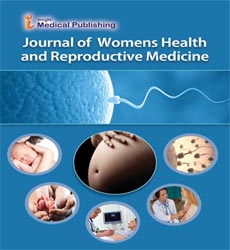MIDWIFERY SUMMIT 2020 EDITORIAL 3
James Okeya
A.I.C Kijabe hospital, as a critical care nurse-in pediatric ICU. In Nairobi, Kenya, E-mail: jamesorengel1@gmail.com
Nurses Worldwide Global Women’s Health Market
The market research analysts have predicted the global women’s health market to grow at a CAGR of more than 3% over the forecast period. With many countries improving the healthcare facilities, the market for women’s health will have a positive outlook in the coming years. Many countries have substantially increased their healthcare budgets as a part of their social security measure. For instance, the US government spend 17% of their GDP on the healthcare sector in 2014. With such increases in the budgets by various countries, the women’s health market is expected to show growth until the end of 2020.
In the research report, the analysts have estimated factors such as the growing awareness of birth control methods will spur the growth of this market in the forecast period. Contraception and fertility control are supported by the governments of developing nations such as India and China to curb the growing population. However, in western countries, women have stopped using contraceptive pill due to their side effects and are increasingly using IUDs and implants. Therefore, the increasing awareness about alternative growth methods will aid in the growth of this market until the end of 2020.
Nursing and midwifery Manpower analysis of England
In the year to July 2018, the number of nurses and health visitors has scarcely changed – increasing by less than 0.5% to 282,661 FTE. There are now more than 41,000 qualified nursing and midwifery posts reported vacant in the NHS in England – more than 1 in 10.15 However, the overall picture of stagnation in the numbers masks some wide differences between areas of nursing (Figure 1). For example, while the FTE number of nurses and health visitors in children’s health grew by 2.2%, and in mental health grew by 0.5%, in community services it fell by 1.2%. This fall was driven by a decrease in the number of health visitors negating a small rise in the number of other nurses working in community services.
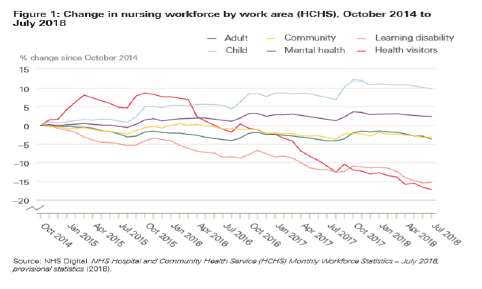
Over the year to July 2018, the number of midwives has increased by 0.9% (201 FTE), a higher rate of growth than in the previous year, with a total of 21,482 FTE midwives in employment at the end of June 2018.
Worldwide analysis.
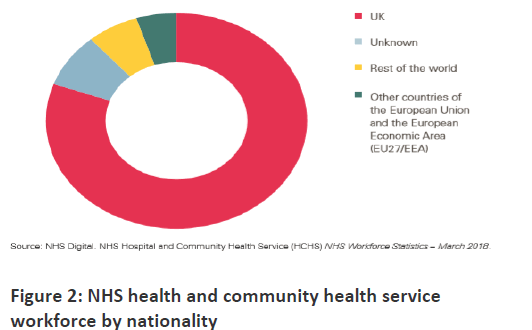
Overall, about 5.5% (59,197 FTE) of the NHS workforce in England are nationals of other countries of the European Union (EU27) and the European Economic Area (EEA).The largest proportion, 20% (11,984 FTE), are from Ireland. Among nurses and health visitors (6.9%) and doctors (9.6%), EU27 nationals make up a more substantial share. The most recent data show that, in 2017/18, the number of NHS staff coming from EU27 states has fallen, while the number of staff from EU27 states leaving the NHS has risen (Figure 8). As a result, the net inflow has reduced from just under 3,000 to about 900. However, among nurses and health visitors, the latest figures show a net outflow of 1,687 in 2017/18, compared with a net inflow of 635 in the previous year.
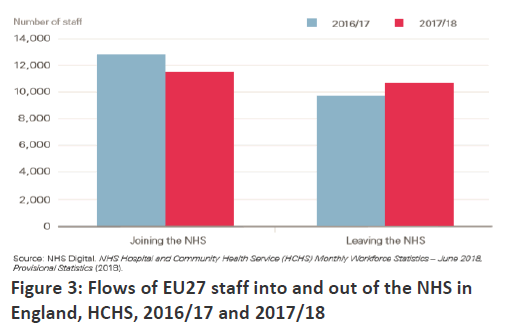
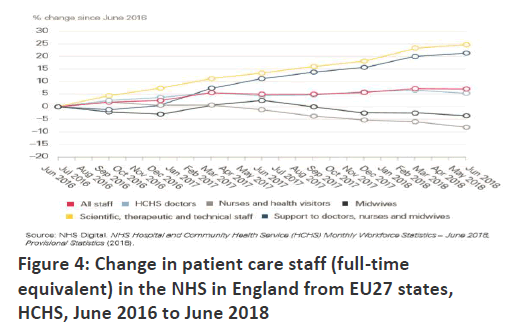
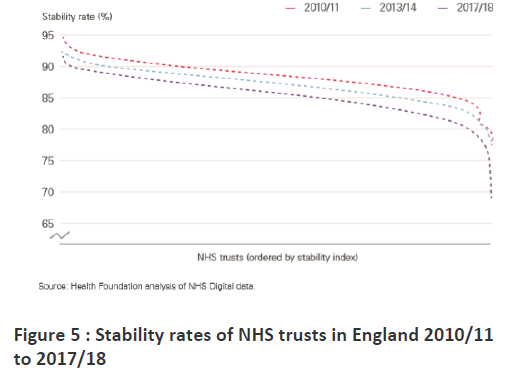
Midwives & Doulas Industry in the US - Market Research Report :US Midwifery Industry Trend
The Midwives and Doulas industry comprises non physician healthcare providers that aid the delivery of babies and care of the mother. Industry operators offer care to childbearing women during their pregnancy, labor and the postpartum period. They may also help care for the newborn through six weeks of age, including assisting the mother with breastfeeding. Industry revenue has grown over the five years to 2019, rising at an annualized rate of 0.7% to $3.3 billion. In 2019 alone, industry revenue is projected to grow 2.8%. Similarly, industry profit margins have increased slightly over the past five years.
April 2019 Labor away: Expanding healthcare coverage will raise demand for industry services
-Total Revenue in 2019- $3bn
-Number of Businesses - 17,246
-Annual Growth 2014-2019 - 0.7%
-Industry Employment - 22,058
Industry SWOT Analysis
The industry is exposed to the following threats and opportunities:
• The largest source of external competition for the Midwives and Doulas industry comes from gynecologists and obstetricians. Births led by obstetricians as opposed to midwives draws revenue away from this industry. Traditionally, in the United States, most births are led by an obstetrician and not a midwife. In midwife-led births, however, an obstetrician only steps in when a midwife determines that it is medically necessary for the mother or baby. In 2019, demand for gynecologists and obstetricians is anticipated to increase, presenting a potential threat to industry operators.
• The number of births represents the number of registered annual births in the United States. Demand for health care providers that guide women through childbirth, including nonphysician midwives and doulas, is ultimately dependent on the number of babies being born. An increase in births raises demand for midwives and doulas. In 2019, the number of births is anticipated to increase, presenting a potential opportunity for the industry.
Scope and Importance of Midwifery:
The maternity specialist works in association with ladies, all alone expert duty, to give ladies the vital help, care, and exhortation amid pregnancy, work and the baby blues period up to a month and a half, to encourage births and to give care to the infant.
The birthing assistant comprehends, advances and encourages the physiological procedures of pregnancy and labor, recognizes confusions that may emerge in mother and infant, gets to proper medicinal help, and executes crisis measures as fundamental. At the point when ladies require referral, maternity specialists give birthing assistance mind in a joint effort with other wellbeing experts.
Birthing specialists have a vital part in wellbeing and health advancement and training for the lady, her family and the group. Maternity care rehearse includes illuminating and setting up the lady and her family for pregnancy, birth, breastfeeding, and parenthood and incorporates certain parts of ladies' wellbeing, family arranging, and newborn child prosperity.
The birthing specialist may rehearse in any setting, including the home, the group, healing centers, or in some other maternity benefit. In all settings, the maternity specialist stays capable and responsible for the care she gives.
Why to Attend:
Midwifery Summit 2020 on 12-13, 2019, Sydney, Australia will be a big conference dedicated to Digital Midwifery concept. This provides premier technical forum for learning and reporting about latest research and development, along with discussions on new applications and technologies. This event includes presentations all over the world and professional networking with different industries and well leading working groups and panels. This global event will provide an excellent opportunity for Doctors, Health care experts, Hospital Administrators,Epidemiologists, Nutritionists, Physicians, Nurse practitioners, Health care analysts, Doctors, Business delegates, Young Researchers encouraging the pro-found administration of medicaments and explore case reports with the results to justify cure and healing for various ailments.
2020 international year of nursing and midwifery Noting that 2020 was the 200th anniversary of the birth of one of the founders of modern nursing, Florence Nightingale, the WHO Board recommended to the Health Assembly to designate 2020 as the Year of Nursing and Midwifery.Thus it makes this conference so important if you want to contribute a sustainable add on to boost up the detailed approaches of Midwifery concept.Midwifery Congress 2020 is looking forward to seeing all in Sydney, Australia
Target Audience:
Midwifery Congress 2020 is intended for:
Midwives
Hospital Administrators
Doulas
Nurses
Doctors
Nurse Practitioner
Physician
Community Health Workers
Midwife Nurse Educator
Nurse Researcher
Scientist and Professor
Registered Nurse (Child and Family Health)
Registered Nurse (Community Health)
Registered Nurse (Developmental Disability)
Mothercraft Nurse
Students
Business Entrepreneurs
Training Institutes
Data Management Companies
Software Developing Companies
Medical Devices Manufacturing Companies
List of Midwifery Association:
Aboriginal Nurses Association of Canada
American Nurse Association
Nursing and Midwifery Council
New Zealand Nurses Organisation
Nursing &Midwifery Council United
Royal College of Midwives
Societies associated with Midwifery and Women’s Health:
Societies in Australia:
Australian Nursing & Midwifery Accreditation Council
Australian Nursing & Midwifery Federation
Nsw Nurses & Midwives Association
Acu Midwifery Society
Societies in Asia:
Afghan Midwives Association
Bangladesh Midwifery Society
Cambodian Midwives Association
Zhejiang Midwives’ Association (an affiliate of the Zhejiang nurses’ association)
AssociaÒ«ão Das Parteiras De Timor-Leste
Hong Kong Midwives Association
Society of Midwives of India
Ikatan Bidan Indonesia | Indonesian Midwives Association
Japanese Midwives Association
Japan Academy of Midwifery
Japanese Nursing Association, Midwives' Division
Korean Midwives Association
Sarawak Midwives Association
Mongolian Midwives Association
New Zealand College of Midwives
Midwifery Association of Pakistan
Sri Lanka Nurse Midwives Association
Taiwan Midwives Association
Vietnamese Association of Midwives
Singapore Nurses Association
Singapore Women’s Association
Singapore lifesaving Society
Singapore Psychological Society
Counselling and Care Centre
Children’s Aid Society
Association for Early Childhood Educator
Home Nursing Foundation
Help Family Service Centre
Moral Family Service Centre
Ntuc Child Care Co-Operative
Nulife Care & Counselling Services
Societies in Worldwide:
National Association of Certified Professional Midwives (us)
Association of Women's Health, Obstetric and Neonatal Nurses (awhonn) (us)
American Health Care Association
Australian Nursing Federation
Academy of Neonatal Nursing (us)
European Midwives Association
Danish Association of Midwives
Estonian Midwives Association
Federation of Finnish Midwives
Midwives Association of Georgia
Icelandic Midwives' Association
Norwegian Nurses Association
Swedish Association of Midwives
Austrian Midwives Association
Association of Radical Midwives
Nurses and Midwives Association of Slovenia
Polish Midwives Association
Czech Confederation of Midwives
Société Française De Maïeutique
German Midwives Association
The Society of Midwives of South Africa
Ethiopian Midwives Association
Uganda Private Midwives Association
Association Nationale Des Sages Femmes De Madagascar
Global Nurses Association Bibliography
https://www.technavio.com/report/global-healthand- wellness-women%E2%80%99s-health-market
https://internationalmidwives.org/ourmembers/ associations-world-map.html
https://nursingworld.org/research-toolkit/Research- Funding
Open Access Journals
- Aquaculture & Veterinary Science
- Chemistry & Chemical Sciences
- Clinical Sciences
- Engineering
- General Science
- Genetics & Molecular Biology
- Health Care & Nursing
- Immunology & Microbiology
- Materials Science
- Mathematics & Physics
- Medical Sciences
- Neurology & Psychiatry
- Oncology & Cancer Science
- Pharmaceutical Sciences
